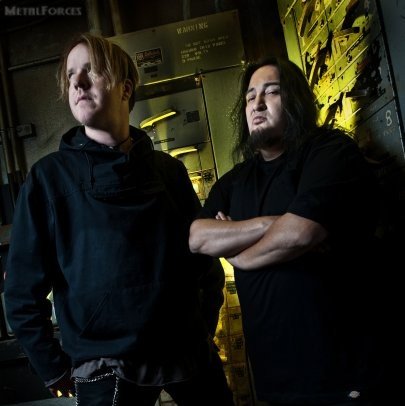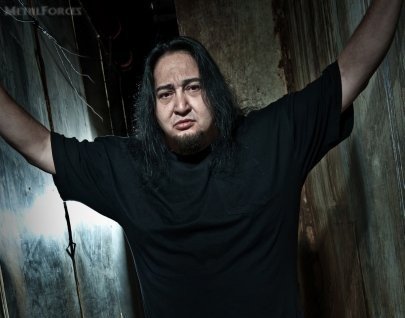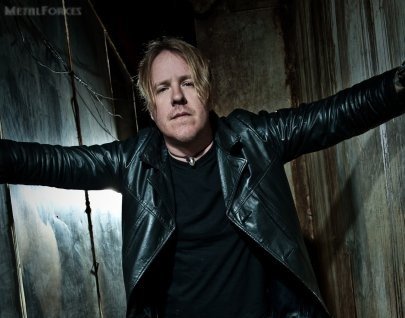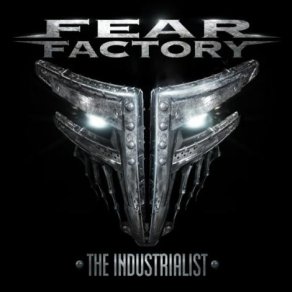
FEAR FACTORY – Recharged
Anthony Morgan
December 2012

|
Writing sessions in support of June 2012’s The Industrialist – the eighth full-length by Los Angeles, California-based industrial metal outfit Fear Factory – began in earnest during early 2011. Guitarist and co-founder Dino Cazares as well as friend John Sankey (drummer of technical death metal group Devolved) composed material in a studio, Burton C. Bell supplying vocals to the music later in the process.
“We did a lot of stuff off of the computer, a lot of drum programming off of the computer,” Dino notes. “We had 90% of the record written before we actually went into the studio, and it worked out great. The majority of the last one (February 2010’s Mechanize) had been written by me and Burton. We had a couple of other musicians in the band who contributed a little bit to the writing process, but a good portion of it was written by me and Burton.”
The axeman and Burton comprise Fear Factory’s sole official members. “The other guys – Mike Heller (drums, System Divide) and Matt DeVries (bass, ex-Chimaira rhythm guitarist) – are live session musicians,” he confirms. “We hope that they stay around, but you never know. When you’re a hired member obviously it’s like a job, so you can go out and get another job. This is like a job for them, so they have the choice to come and go as they please.”
Mike Heller and Matt DeVries might perhaps contribute to Fear Factory’s ninth studio record. “There’s a good possibility that that might happen,” Dino considers.
Bereft of a sticksman at the time of recording The Industrialist, the assortment opted to use a drum programme. “We’ve been experimenting with that since back in 1992, back when our first album came out (August 1992’s Soul Of A New Machine),” the songwriter muses. “Actually before that, we experimented with drum machines when we were doing demos. Later on the drum machine turned into a drum programme on a computer, obviously. Definitely a lot of things have come so far ahead, and the technology has gotten so much better that you can pretty much do it on your laptop. You can write when you’re on the road. We always liked that sound; we always liked what that was about. We always liked that sound, and we always liked how tight it was. We’ve always liked that machine sound, so that’s what we did. We used it for this record. Another thing too is the drummer we had went out and did some other band, so we were left without a drummer. We decided to do it ourselves.”
Whether a rhythmist will step behind the drumkit or a programme will be utilized yet again on future recordings is uncertain. “I don’t know at this point,” Dino chuckles. “It’s a little too early to start talking about the next record. I don’t know if we’re gonna go with a drum machine, or if we’re gonna go with a live drummer. Even if we use a live drummer though, at what point does it become live anymore? After all the sound replacements, and after all the… most people record a live drummer onto a computer, and then they put it to a grid. They align every hit to be perfect, and then they sound replace it to give it more of a mechanical feel. At what point is it human anymore? Whether we use a live drummer or not, it’s gonna be the same outcome.”
With each platter, the axe-slinger’s mission is always the same. “With every album that I do I always try to improve my tone, or try to add something to it, or just try to make it a little bit different,” he discloses. “On this record, I didn’t really change it too much – the only difference was that I went directly into the computer. On the last record, I used a cabinet. This time, I used a POD HD going directly into the computer which gave it a little bit of a different tone. My overall guitar tone though is very mid-rangey. It’s got a really high, bright, mid-rangey tone. It’s clear. You can hear every note that I’m picking, and I think it’s got a lot of attack. A lot of that has to do with my right hand.”

|
Albeit occupying the position of lead guitarist, Dino has supplied bass to several Fear Factory outings. “On our last record Mechanize, the bass player (Byron Stroud) couldn’t play the parts,” he informs. “He just couldn’t pick that fast, so I did it. Then on the new record, I did the bass parts because we didn’t have a bass player – I played them (laughs). On Soul Of A New Machine and and Demanufacture (June 1995), I played bass as well. When we recorded Soul Of A New Machine, we didn’t have a bass player. It wasn’t until Demanufacture we had a bass player (Christian Olde Wolbers), but he didn’t know the songs so I played bass. It makes it much tighter because it’s me playing all of the rhythm tracks, rhythm guitar and bass.”
Fear Factory attempts to flavour each full-length with its own unique idiosyncrasies. “Soul Of A New Machine was obviously a very raw sounding record,” the co-founder begins. “We did Fear Is The Mindkiller (April 1993) which was the first remix EP, and we did Demanufacture which was a much more refined Fear Factory. The syncopated drum parts and the guitar parts were a lot tighter, and Burt’s vocals improved 100%. It had a much more mechanical, cold feel to it, whereas Obsolete (July 1998) had more of a well-rounded, warmer tone. There are more human elements in that record. It was very big and it was dark, and it was an emotional album. Then we did Digimortal (April 2001), which had more of what our fans called the commercial aspect of Fear Factory. We had some very big songs like ‘Linchpin’, which was a very big song for us. Then there were a couple of records I wasn’t on (April 2004’s Archetype and August 2005’s Transgression). Mechanize had more of a thrash element and The Industrialist is more of a throwback to what we were in the past, Demanufacture and so on. We try to sound a little bit different, and I believe that we’ve pretty much achieved that.”
Digimortal’s resultant commercialism was arguably intentional. “There was pressure from the record company, because Obsolete was such a big record in America and actually worldwide,” Dino remembers. “We got a lot of Gold records from all over the world with Obsolete, so they tried to push us in a commercial direction to sell millions of records. That’s what happened. I’m definitely still happy with it, though. Of course on every record there’s something here and there that you might wanna change, but I really like the record overall. There are a couple of songs I could do without, but besides that most of it was pretty good. I think some of our older fans were turned off by it, but I think overall they still liked the album. When we play those songs live, they still love them. ‘Linchpin’ was one of our biggest songs, and it was off of that record. A lot of people know that song; I would say it’s just as big as ‘Replica’. A lot of people were introduced to Fear Factory through that song.”
The Industrialist, meanwhile, bears less of a thrash influence than predecessor Mechanize. “I think a lot of that influence came from me, because I had been doing Divine Heresy for the last seven years,” the guitarist observes. “Divine Heresy had a lot of thrash elements and a lot more guitar middling, and that just carried over into Mechanize. The Industrialist is more of a throwback to Demanufacture in some parts; we wanted to bring back the more classic elements of Fear Factory on The Industrialist.”
Predecessor Mechanize marked the final Fear Factory full-length to be recorded while bassist Byron Stroud remained affiliated with the group, albeit not including his services. “Byron just said that he didn’t wanna be in the band anymore, and I said ‘Okay,’” Dino recalls. “I didn’t have a problem with it. You’ll have to ask him why he left though, because I don’t know. I really don’t know.”

|
Byron never explained why he wished to leave Fear Factory, the axeman reckons. “Not to me,” he states. “He spoke to Burt about it, but not to me. He was never really an official member of the band. Nobody is an official member of the band except Burt and I.”
While bandmates, there was no ill will between the two as far as Dino is concerned. “I got along with him great,” he feels.
The Industrialist’s title cut inaugurates the group’s eighth studio proper, essentially introducing the full-length. “It’s pretty much the story of The Industrialist, which is an automaton who becomes sentient,” the composer divulges. “He realises that he isn’t human, and so he seeks his creator to try to gain more life. The concept was a collaboration between Burton and I. The music video was basically shot… We used live footage from Belgium, a festival called Graspop. One of our really good friends named James Zahn is kind of a computer geek who does a lot of stuff with computer technology (laughs). He does a lot of CGI graphics, and he was able to add a lot of footage from different factories and things like that, things that go along with what we’re about. He kind of put them together, and made a video out of it.”
Longtime associate Rhys Fulber produced the effort, Greg Reely handling mixing duties. “Way back in the day Rhys’ role was just doing keyboards for the band,” Dino imparts. “After Fear Is The Mindkiller and during the recording of Demanufacture though, he switched from keyboards to being a co-producer with the band. Greg Reely mixed all those records, and that’s been our team for a long time. When I came back into the band I told Burton that we needed to bring those two guys back, and that’s what we did. We brought Rhys Fulber back, and we brought Greg Reely back. That’s our production team.”
The production team of Rhys Fulber and Greg Reely isn’t carved in stone, however. “I’m open to change if something better comes along,” the axe-slinger admits. “I’m very happy and content with what the team really has right now, but you never know. We might change our minds down the road.”
Previous individuals to spearhead the production helm include Colin Richardson, fired during mixing sessions for Demanufacture. “We weren’t happy with the direction Colin went with the mix, so we had to fire him and we’ve never looked back,” Dino judges. “If Colin had mixed the album it would never have been as groundbreaking as it is, I’ll put it that way. We never went back to him again for obvious reasons. As far as other producers, since I’ve been in the band there hasn’t really been anybody else except Rhys and Greg. A guy named Mike Plotnikoff mixed Digimortal, but that was it.”
Touring commitments to promote The Industrialist began during April 2012, almost two months prior to the album’s issue. “The touring has been going great,” the co-founder exclaims. “We’ve been touring non-stop and will be up until December 18th, which will be the last show of 2012. We’ve added a couple of different songs to the setlist. We’ve added ‘What Will Become’ (from Digimortal), which we haven’t done in awhile. We haven’t actually done that since 2001 really, and we’re gonna be doing some other songs here and there. We’re gonna be doing ‘Cars’ (from Obsolete) by Gary Numan, which we haven’t done in a long time. I’m trying to think of what else… We’re doing ‘Pisschrist’ (from Demanufacture), and a lot of stuff off of the first record. We did ‘Self Immolation’ live and we did ‘Scumgrief’ live, because 2012 is the 20th anniversary of our first album Soul Of A New Machine. We’ve been doing different songs live from that album. We’ve been doing about two or three songs off of The Industrialist as well. We open up with ‘The Industrialist’, of course – that’s the first song off of the new record. We also do ‘Recharger’, and ‘New Messiah’. We have done other ones; we’ve done a song called ‘God Eater’ in the States. We do about three or four songs, but we change them over.”

|
1992 debut Soul Of A New Machine was recorded under unique circumstances. “I remember right when we first recorded the record, there was the Rodney King riots,” Dino reminisces. “Colin Richardson was from England. He flew from England, and he was really scared to actually land in LA because LA was pretty much in lockdown because of the riots. People pretty much destroyed the whole city, just about looting and lighting fires. There was pretty much a riot on at that time in LA. I just remember that our producer almost didn’t wanna come to LA because he was scared (laughs). We managed to make it work, and there was actually a strict curfew at night. Everybody had to be home by 10pm – you couldn’t be on the streets at 10pm. When we recorded the record, we had to make sure that we only recorded during the day. We couldn’t even go into the studio late at night, because there were still national guards on the street.
“That was our beginnings, and pretty much the base of Fear Factory. You definitely heard a lot of our influences on that record, everything from Godflesh to Napalm Death to industrial music. It was definitely just an introduction to who we were. It wasn’t until Demanufacture – our second album – that we redefined our sound, and that became who we are. Production wise it was definitely thick, and it was a very futuristic sounding album. There was nothing else out there that was like it. Also, there were a lot of elements in there that we were able to redefine and make better. We had more of a mechanical Fear Factory, with a guitar-based, drum-syncopated sound. Burton also redefined his vocals; there were definitely more melodic vocals, and heavier vocals. It became our staple; it became a staple in metal music.”
Cuts lifted from Demanufacture and Obsolete – albums two and three – heavily figure among the guitarist’s favourites. “‘Self Bias Resistor’ (from Demanufacture) is definitely one of my favourite tracks, ‘Demanufacture’, obviously ‘Replica’ (from Demanufacture), and songs like ‘Edgecrusher’ (from Obsolete) and ‘Shock’ (from Obsolete),” he cites. “There’s also the new one ‘The Industrialist’. Those are all really, really fun tracks to play live. Pretty much all of the songs that we play live now are really fun to play.”
Material from Archetype and Transgression – recorded during Dino’s seven-year exile (2002-2009) – are absent from Fear Factory’s live setlist. “At first I didn’t want to play any of the songs that I wasn’t on,” he confesses. “There was then a point where I was like ‘We should do a song or two.’ Then Burton said ‘No, we’re not doing any’ (laughs). I don’t really like those records, but no-one seems to really say too much about it. No-one really requests that material, so it doesn’t really matter actually.”
Outside of the Fear Factory sphere, the axeman’s musical preoccupations include Divine Heresy. “I’m hoping at some point to do another record, but Fear Factory pretty much keeps me occupied 24/7,” he explains. “I’m not sure who’s gonna be in the band right now (laughs). A lot of things are going on (laughs). I’m not sure who’s gonna be doing it right now, because the other guys have other projects and are all doing other stuff. I haven’t really decided who I’m gonna have play on the record yet but I’m sure Travis (Neal, vocals) will be doing the next record, yeah.”
The Industrialist was released in Europe on June 1st, 2012 via AFM Records, and subsequently on the 5th in North America through Candlelight Records.
Interview published in December 2012.





